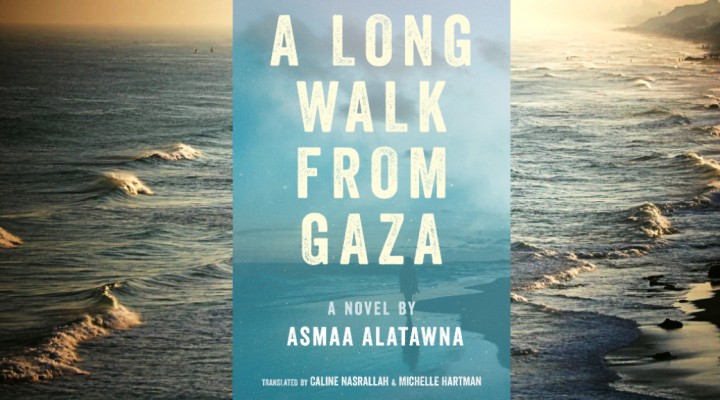A Long Walk From Gaza: A tale of one Palestinian woman’s journey of pain and hope in search of freedom

Asmaa Alatawna’s novel, A Long Walk From Gaza, is split into two parts: leave and return. Two simple words which, both in the novel and in the Palestinian context, are imbued with heavy meaning.
Alatawna’s protagonist is a female from Gaza in search of various forms of freedom, although not necessarily the way non-Palestinians envisage freedom for Palestinians.
In between stereotypes of Palestinians and the Palestinian anti-colonial struggle, the humanity of Palestinians is many times lost.
The book commences with the narrator’s departure from Gaza, as she maps her escape strategically and with a clear focus on freedom.
Jose, a Spanish teacher living in Jerusalem, formerly excavating for antiquities with his Zionist girlfriend, provides her first path towards freedom.
Alatawna’s narrator is explicit about her consciousness and anger: “He and that girl had plundered things that belonged to me,” she muses, rationalising her decision to use Jose’s affection towards her as the means to get out of Gaza, leaving behind a history of family trauma and abuse which seep through the text, particularly in the second part of the book.
Later escaping to the south of France, the narrator is traumatised to the point that she is unable to speak. It is there that the first inklings of her grief are manifested, along with her coming to terms with, and recognising, other forms of forced displacement.
“They were just like the stories of suffering that I’d heard from both my grandfathers – my dad’s dad, the Bedouin, and my mom’s dad, the farmer.”
The people she met sympathised with the Palestinian cause, yet their perceptions made it hard for the protagonist to share her traumatic experiences.
Several times, the protagonist mentions the yearning to wish a normal life, to have a safe space of her own — a side that she kept hidden to prevent side-lining the bigger Palestinian struggle for freedom.
“What happened to me shouldn’t affect people’s perception of the Palestinian cause or obscure the suffering of the entire Palestinian people.”
Yet, in a way that seems contradictory, it is through the personal narrative that the readers come to terms with the complexities of the Palestinian anti-colonial struggle and how intertwined it is with the daily lives of Palestinians.
From Israeli violence to armed resistance, from cultural influences to generational trauma, Alatawna builds a narrative that is gripping, fast-paced and reeking of foreboding, as the second part of the book shows.
Return, in this case, is not just a physical return to Gaza following a decision to leave for the Gulf. It is also a return to memory, of revisiting the reasons the narrator decided to permanently leave the enclave.
A childhood marked by violence that required unquestioned obedience sheds light on the patriarchal society that normalises domestic violence, for example. The same father who meted out violence against his family also absorbed the news, keeping himself informed of Palestinians who were detained or killed during the First Intifada.
“His constant surveillance meant he occupied all the mental space I had. I was terrified of him, of the pain of his insults and beatings,” the narrator says of her father when she finally leaves home to study English literature – her first act of rebellion against her father being to change her course enrolment.
Caught in between family dynamics and trying to carve out a space for herself, the narrator’s solace, as her childhood memories portray, was playing with boys in the neighbourhood, for which she would get scolded.
Her numerous escapes from home and the bonds she forged with her childhood friends, particularly Rami and Abdullah, read as permanent inscriptions on the story of her life, as both boys become involved in the Palestinian resistance.
As the narrator grows up, the corruption as a result of Israeli colonialism and the Palestinian Authority’s collaboration grows more evident.
In contrast with the resistance, the narrator grapples with the fact that complacency is another factor imprisoning Palestinian society, and the ramifications of that hit certain areas more than others.
The socio-economic divide, the political affiliations and the benefits one may reap or be excluded from, all played a part in throttling Palestinian society further, even as Israeli colonial expansion usurped more Palestinian territory.
As Israeli bombings take hold of Gaza, the narrator loses her childhood friend and first love, starting a cycle of grief that fuels her desire to escape from Gaza, juxtaposed against her admission that she “lost her own will to live”.
The novel’s gloom is permeating, and the writing compels the reader to experience, at least through imagination, the Palestinian people’s feelings of loss, of grief, of death.
As the second part of the book completes its cycle to arrive, from return, to leaving once again, the weight of traumatic experiences in one’s young life cling to the reader, almost as if forcing an acknowledgement of another’s pain in an intimate matter.
Perhaps it is the sudden ending of the book or the fact that one expects a smooth conclusion — one that ties ends neatly, that creates the ultimate disturbance that all non-Palestinians need to ponder: that upon closing the book, the trauma continues, like the ongoing Nakba.
https://www.newarab.com/features/long-walk-gaza-one-palestinian-womans-quest-freedom
 TheAltWorld
TheAltWorld 
0 thoughts on “A Long Walk From Gaza: A tale of one Palestinian woman’s journey of pain and hope in search of freedom”